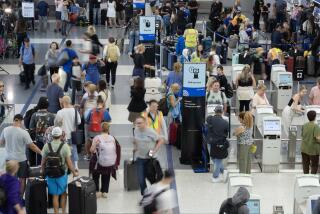Fliers’ bill of rights gets lift
- Share via
The travails of passengers on a flight stranded overnight on an airport tarmac in Rochester, N.Y., and new data on airline delays are giving fresh ammunition to supporters of an airline passenger bill of rights.
Two major business travel groups, frustrated by ongoing airline delay problems, have joined the call for federal legislation to address snafus like the nightmare that took place in Rochester last month.
The Aug. 8 flight from Houston to Minneapolis-St. Paul, Minn., was diverted to Rochester because of severe weather. But things got ugly when -- due to a combination of bad luck and bad decision-making -- the plane sat on the tarmac for nearly six hours, while the 47 passengers subsisted on pretzels and stale compartment air.
A Transportation Department investigation put most of the blame on a local representative of Mesaba Airlines for refusing to let the captain of the ExpressJet plane discharge the passengers. The Mesaba representative erroneously believed that the passengers could not be allowed in the terminal because no one from the Transportation Security Administration was available to screen passengers.
Earlier this week the Bureau of Transportation Statistics released its latest on-time airline data, showing that 164 flights were delayed for at least three hours in July. The longest delay was a Delta Airlines flight from New York’s JFK Airport to Portland, Ore., that was on the tarmac for about 6 1/2 hours before it was canceled.
One version of the passenger bill of rights under consideration by Congress requires airlines to give passengers the option to get off the plane once they have waited on the tarmac more than three hours.
The National Business Travel Assn., which represents more than 4,000 corporate travel managers and other travel professionals, announced last month that it had switched its position and now supported such legislation. The association has previously opposed such a law, saying it was confident the airlines could come up with a solution without the need for federal legislation.
“When we’ve got travelers stuck on planes sitting on the tarmac overnight, it’s clear the problem has spun out of control and legislation is the best solution,” association Chairman Kevin Maguire said in a statement.
The Business Travel Coalition, which represents the travel departments of about 300 businesses worldwide, also switched sides this week after releasing the results of an online survey that showed 82% of travel professionals, business travelers and others support legislation to let passengers off a plane that sits on a tarmac for three hours or more.
Kevin Mitchell, chairman of the coalition, had previously testified before Congress against a federal law, saying the airlines should be allowed solve the problem voluntarily. But he said the survey showed that business travelers were fed up with tarmac delays. The Rochester incident, Mitchell said, showed that airlines are not ready or willing to fix the problem.
Kate Hanni, founder of the Coalition for an Airline Passengers’ Bill of Rights, a nonprofit airline passenger advocacy group, called the support of the two business groups “a huge victory for airline passenger rights legislation.”
Still, most airlines continue to oppose such a law, saying the final decision on whether to return to the terminal or stay on the tarmac should be made by the flight crew and federal aviation officials at the airport.
Elizabeth Merida, a spokeswoman for the Air Transport Assn., which represents the nation’s biggest airlines, said that each tarmac delay was the result of unique circumstances and that imposing a federal mandate could make matters worse for passengers.
For example, she said, if a plane is delayed because of bad weather and a federal law forces the pilot to return to the terminal, the plane can lose its spot in the departure lineup, further delaying takeoff. Merida also noted that it was not always possible for a plane to turn around and return to the terminal on a crowded runway.
Still, Merida called the incident in Rochester “unfortunate,” adding that major airlines had already adopted voluntary procedures to deal with extensive tarmac delays.
But that doesn’t appease Rep. Daniel Lipinski (D-Ill.), a leading passenger rights advocate who is drafting a bill to impose fines on airlines that strand passengers for more than three hours.
Given the threat of fines and growing support for federal legislation, passenger rights advocates say they expect airlines and federal officials to reach an agreement on tarmac delays by the end of the month.
Stay tuned.
Next: Oversize carry-on bags
Tarmac delays are just one airline problem Lipinski is tackling. He is also taking on airlines on the issue of oversize carry-on luggage.
Because of increases in baggage fees, more passengers are cramming as much as they can into carry-on luggage. Also, the maximum size of a carry-on bag varies by airline. For example, Southwest Airlines limits carry-on bags to 10 inches by 16 inches by 24 inches. For Delta, the maximum size is 9 inches by 14 inches by 22 inches.
To resolve the problem, Lipinski has introduced legislation that sets a nationwide standard for carry-on luggage to be no bigger than 10 inches by 18 inches by 22 inches.
The bill already has the support of a key player in the matter: the Assn. of Flight Attendants, which represents more than 50,000 workers at 20 airlines. The group said flight attendants were tired of trying to settle disputes over carry-on luggage and getting knocked in the head by bags that don’t fit in the overhead bins.
The Air Transport Assn., however, opposes the bill, saying -- once again -- that this is an issue best left to the individual airlines to resolve.
--
More to Read
Inside the business of entertainment
The Wide Shot brings you news, analysis and insights on everything from streaming wars to production — and what it all means for the future.
You may occasionally receive promotional content from the Los Angeles Times.











